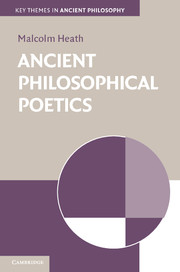Chapter Three - The natural history of poetry
Aristotle
Published online by Cambridge University Press: 05 December 2012
Summary
Aristotle brings changes in substance and in style. Consider this quotation from the Poetics (25, 1460b35–61a1):
If it is neither true nor as it ought to be, one might reply that this is what people say; e.g. stories about the gods: it may be that talking like that is neither an idealisation nor the truth, and perhaps Xenophanes was right; but at any rate, that is what people say.
The compression of this passage is characteristic. Aristotle often presents a key concept, argument or conclusion without full explanation, leaving the reader to unpack the meaning and its unstated rationale. In the present instance, once the meaning is unpacked, the passage appears to take a stance radically opposed to that of Plato. The context is an overview of ‘problems’ in poetry, and the kinds of solution available. Fourth-century intellectuals had subjected the Homeric poems to minute scrutiny, revealing many features that were, at first sight, odd or objectionable. These included apparent implausibilities in the narrative. For example, why does Helen not notice her brothers’ absence from the Greek army until the ninth year of the war (Il. 3.236–42)? Why does the Phaeacian crew that takes Odysseus home to Ithaca not wake him up, but leave him asleep on the shore (Od. 13.116–25)? Other passages were objectionable on moral or theological grounds: for example, Achilles’ insulting outburst against Agamemnon (Il. 1.225–44) or the gods fighting each other (Il. 21.385–513). Moral and theological objections of this kind are familiar from Republic 2 (§2.3), but Aristotle here looks back to Plato’s predecessor, Xenophanes (§1.2).
- Type
- Chapter
- Information
- Ancient Philosophical Poetics , pp. 56 - 103Publisher: Cambridge University PressPrint publication year: 2012



